Related Research Articles

The Republic of Texas was a sovereign state in North America that existed from March 2, 1836, to February 19, 1846. It shared borders with Mexico, the Republic of the Rio Grande, and the United States of America.
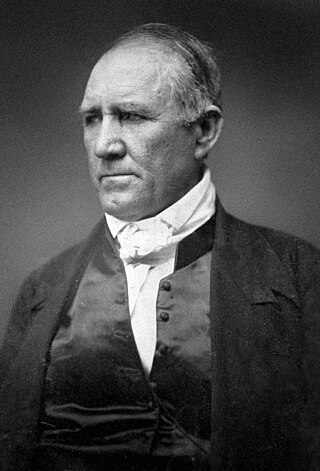
Samuel Houston was an American general and statesman who played an important role in the Texas Revolution. He served as the first and third president of the Republic of Texas and was one of the first two individuals to represent Texas in the United States Senate. He also served as the sixth governor of Tennessee and the seventh governor of Texas, the only individual to be elected governor of two different states in the United States.
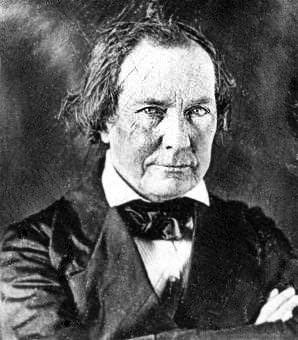
Mirabeau Buonaparte Lamar was an American attorney, politician, poet, and leading political figure during the Texas Republic era. He was elected as the second president of the Republic of Texas after Sam Houston. He was known for waging war against bands of Cherokee and Comanche peoples to push them out of Texas, and for establishing a fund to support public education.
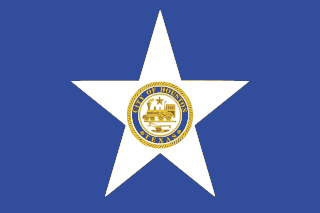
The city of Houston in the U.S. state of Texas was founded in 1837 after Augustus and John Allen had acquired land to establish a new town at the junction of Buffalo and White Oak bayous in 1836. Houston served as the temporary capital of the Republic of Texas. Meanwhile, the town developed as a regional transportation and commercial hub. Houston was part of an independent nation until 1846 when the United States formally annexed Texas. Railroad development began in the late 1850s but ceased during the American Civil War. Houston served the Confederacy as a regional military logistics center. The population increased during the war and blockade runners used the town as a center for their operations.
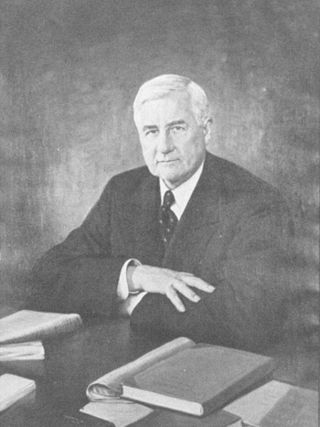
Jesse Holman Jones was an American Democratic politician and entrepreneur from Houston, Texas. Jones managed a Tennessee tobacco factory at age fourteen, and at nineteen, he was put in charge of his uncle's lumberyards. Five years later, after his uncle, M. T. Jones, died, Jones moved to Houston to manage his uncle's estate and opened a lumberyard company, which grew quickly. During this period, Jesse opened his own business, the South Texas Lumber Company. He also began to expand into real estate, commercial building, and banking. His commercial building activities in Houston included mid-rise and skyscraper office buildings, hotels and apartments, and movie theaters. He constructed the Foster Building, home to the Houston Chronicle, in exchange for a fifty percent share in the newspaper, of which he acquired control in 1926.
James Sanders Holman was a soldier, entrepreneur, and the first mayor of Houston.
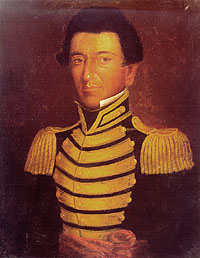
Juan Nepomuceno Seguín was a Spanish-Tejano political and military figure of the Texas Revolution who helped to establish the independence of Texas. Numerous places and institutions are named in his honor, including the county seat of Seguin in Guadalupe County, the Juan N. Seguin Memorial Interchange in Houston, Juan Seguin Monument in Seguin, World War II Liberty Ship SS Juan N. Seguin, Seguin High School in Arlington.
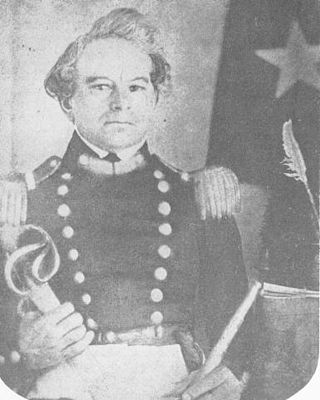
Đorđe Šagić, also known as George (Jorge) Fisher, was a customs officer and early leader of the Texas Revolution.

Margaret Lea Houston was First Lady of the Republic of Texas during her husband Sam Houston's second term as President of the Republic of Texas. They met following the first of his two non-consecutive terms as the Republic's president, and married when he was a representative in the Congress of the Republic of Texas. She was his third wife, remaining with him until his death.

Glenwood Cemetery is located in Houston, Texas, United States. Developed in 1871, the first professionally designed cemetery in the city accepted its first burial in 1872. Its location at Washington Avenue overlooking Buffalo Bayou served as an entertainment attraction in the 1880s. The design was based on principles for garden cemeteries, breaking the pattern of the typical gridiron layouts of most Houston cemeteries. Many influential people lay to rest at Glenwood, making it the "River Oaks of the dead." As of 2018, Glenwood includes the annexed property of the adjacent Washington Cemetery, creating a total area of 84 acres (34 ha) with 18 acres (7.3 ha) still undeveloped.
Timeline of historical events of Houston, Texas, United States:

Thomas Henry Ball was a Texas politician and a Democratic member of the United States House of Representatives. He was mayor of Huntsville, Texas, from 1877 to 1892, and moved to Houston in 1902.

Texas declared its secession from the Union on February 1, 1861, and joined the Confederate States on March 2, 1861, after it had replaced its governor, Sam Houston, who had refused to take an oath of allegiance to the Confederacy. As with those of other states, the Declaration of Secession was not recognized by the US government at Washington, DC. Some Texan military units fought in the Civil War east of the Mississippi River, but Texas was more useful for supplying soldiers and horses for the Confederate Army. Texas' supply role lasted until mid-1863, when Union gunboats started to control the Mississippi River, which prevented large transfers of men, horses, or cattle. Some cotton was sold in Mexico, but most of the crop became useless because of the Union's naval blockade of Galveston, Houston, and other ports.
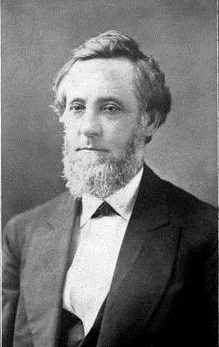
William Robinson Baker was an American railroad executive and politician who served as the 29th Mayor of Houston from 1880 to 1886. Baker was previously the Director and Vice President of the Houston and Texas Central Railroad and represented the 14th district in the Texas Senate for one term, from 1874 to 1876.
The Bowl ; John Watts Bowles was one of the leaders of the Chickamauga Cherokee during the Cherokee–American wars, served as a Principal Chief of the Cherokee Nation–West, and was a leader of the Texas Cherokees.

Wilhelm Carl August Thielepape, was an architect, engineer, teacher, photographer, and lithographer. He was mayor of San Antonio, Texas, during part of the Reconstruction era, and later an attorney in Chicago, Illinois.

Sylvester Turner is an American attorney and politician who is the 62nd mayor of Houston, Texas. A member of the Democratic Party, Turner was a member of the Texas House of Representatives from 1989 until 2016. He attended the University of Houston and Harvard Law School. Turner ran for mayor of Houston in 1991, losing in the runoff election to Bob Lanier. He lost again in 2003, coming in third and thus missing the runoff.
Alexander McGowan was a foundry owner, Mayor of Houston, Texas, and a Chief Justice of Harris County, Texas.

Charles Grafton Bigelow was a businessman who served a single one-year term as the fourth mayor of Houston, Texas, from January 6, 1840, to January 15, 1841, before serving as a colonel in the Mexican-American War.
Nancy Moffette Lea (1780–1864) was the mother of Margaret Lea Houston and mother-in-law of Sam Houston. She was an integral member of the Houston family, running the household when Margaret was ill or pregnant. She is believed to have helped her son-in-law convert and be baptized in 1854. In appreciation, she donated a bell to the Independence Baptist Church in honor of him. The wife of Temple Lea, she inherited an estate from her family that she managed. She purchased a cotton plantation which was operated by 50 enslaved people.
References
- ↑ Carroll, Benajah Harvey (2017). Standard History of Houston Texas. Jazzybee Verlag. p. 18. ISBN 978-3-8496-4919-7.
- ↑ Tiling, M. P. (1913). History of the German element in Texas from 1820–1850. Houston: Moritz Tiling. p. 50. ISBN 978-5-87827-924-6.
- 1 2 Benham, Priscilla (1998). "Houston's Mayors: Developing a City". East Texas Historical Journal. 36 (1): 62–63.